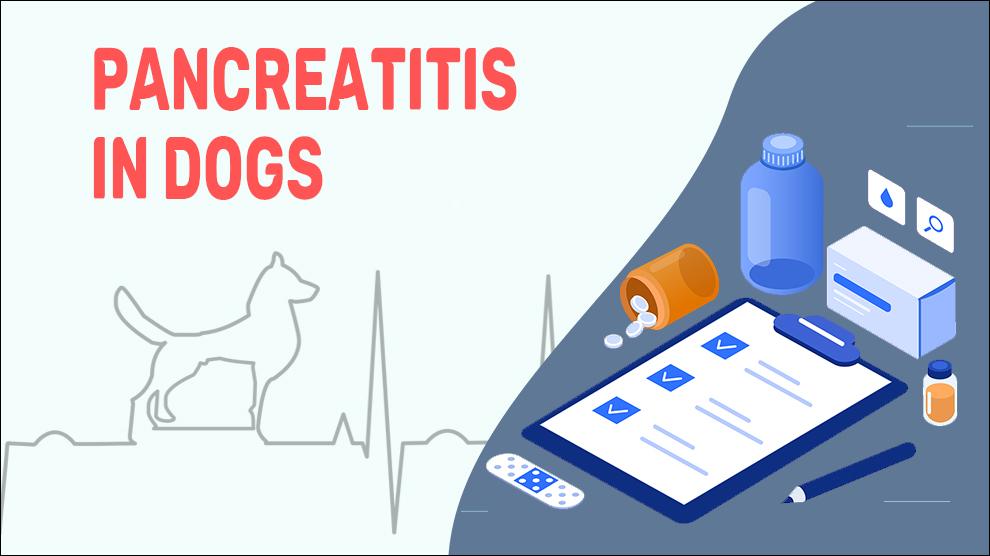What Is Pancreatitis In Dogs?
Pancreatitis is defined as an inflammation of the pancreas. The digestive enzymes in the small intestine (proteases, amylases, and lipases) instead, start to target the pancreas itself. This leads to premature activation of zymogens inside the pancreas. Synthesized as inactive enzymes, Zymogens prevent cell membrane damage within the pancreas leading to an overactive immune system inflammatory response.
Simply, Pancreatitis is the result of the fusion of zymogen granules with lysosomal enzymes in the acinar cells. Consequently, auto-digestion within the pancreas happens, free radicals are produced, inflammatory cells are recruited and inflammatory mediators are produced. This results in damage and further inflammation.
For pancreatitis, the earlier Atlanta classification system used the term “pancreatic abscess” to explain the occurrence of a circumscribed collection of purulent material (with/without necrosis) that is an outcome of episodes of acute pancreatitis.
However, because of no sufficient proof and lack of clarity surrounding the term, the revised classification guidelines in 2012 removed the term “pancreatic abscess” as an infectious component of pancreatitis. Pancreatic abscesses and necrotic mass lesions of the pancreas appear to be sequelae of pancreatitis and have been reported only in dogs.
Symptoms Of Pancreatitis In Dogs
- Abdominal pain
- Severe lethargy
- Recurrent vomiting
- Severe dehydration
- Collapse and shock (sometimes)
Pancreatic abscesses with chronic pancreatitis are typically asymptomatic:
- Decreased appetite to not eating at all
- Severe abdominal pain
- vomiting
- Weakness
Treatment Options For Pancreatitis In Dogs
The treatment depends on the underlying disease or condition or any exposure to toxins.
- In more severe cases, hospitalization at 24-hour intensive care and monitoring
- Intravenous fluids
- Pain medications
- Anti vomiting medication (antiemetics)
- Antibiotics, if a secondary bacterial infection is suspected
- Pancreatectomy: surgery to remove all or part of the pancreas
Home Remedies For Pancreatitis In Dogs
Feeding for Pancreatitis affected dogs should be based on their projected resting energy requirement (RER)
- For dogs weighing <5 kg or >25 kg: 70 × (body weight in kilogram) 3/4
- For dogs weighing between 5-25 kg: [30 × (body weight in kilogram)] + 70
- Intact adult- RER *1.6
- Neutered adult: RER*1.8
- For active, working dogs: RER *2 to 5
Overweight dogs – RER for ideal weight, for underweight dogs- RER for ideal weight * 1.2 to 1.8
Prevention Of Pancreatitis In Dogs
There is no way to prevent pancreatitis as the causes are varied.
Prevention or treatment depends upon the underlying cause and extent/severity of the problem.
Medications for medical conditions should be provided only as required.
Affected Dog Breeds Of Pancreatitis
Miniature Schnauzer, Cocker Spaniel, Yorkshire Terrier, Dachshund, Senior Dogs, Poodle, Sled Dogs, Boxer, Collie, Miniature Poodle, Cavalier King Charles Spaniel
Additional Facts For Pancreatitis In Dogs
1. Causes
- Genetic Predisposition
- Hyperlipidemia
- Hypercalcemia
- Dietary Indiscretions- Indiscriminate eating habits
- Pancreatic Duct Backflow or Obstruction
- Hormonal Imbalances -diabetes, hypothyroidism, and high calcium levels
- Toxins
- Medications: anti-seizure medication potassium bromide
- Trauma to the Pancreas
- Blunt trauma, such as being hit by a car, or even surgical manipulation
2. Types:
Acute pancreatitis: This is the active form of pancreatitis, in which the symptoms come on unexpectedly. A mild form of acute pancreatitis is temporary and the dogs usually recover on their own. However severe forms require hospitalization.
Chronic pancreatitis: This is a long-term condition that originates from frequent damage to the pancreas. However, acute pancreatitis can also be a risk factor for chronic pancreatitis.
3. Mortality:
The mortality rate of acute pancreatitis has remained at about 10-20%. Although the mortality rate of chronic pancreatitis is not available, it causes severe damage to your pancreas. So typically the survival Rate will be reduced if not treated properly.
4. Diagnosis:
- Complete blood count, electrolyte tests, Pancreas-specific tests
- Abdominal CT scan with contrast or contrast-enhanced magnetic resonance imaging (MRI)
- Ultrasound (when CT scan or MRI cannot be performed)
5. Differential diagnosis:
- Pancreatic necrosis without associated infection
- Pancreatic pseudocysts
- Cholangitis
- Cholecystitis
- Gastric ulcer
- Mesenteric ischemia
- Perforated viscus
- Bowel obstruction
6. Prognosis:
Most dogs with mild acute pancreatitis recover within a week and the prognosis is good. However, recovery takes longer in severe acute pancreatitis cases, as complications may need additional treatment. In cases of acute pancreatitis, infected necrosis (rather than pancreatic abscess) represents a major cause of mortality and morbidity. This can result from an infection of either an area of walled-off necrosis (WON) or acute necrotic collection (ANC).
Recognized complications of acute pancreatitis in dogs include acute fluid collections (i.e., pancreatic abscess or pseudocyst), diabetes mellitus, diabetic ketoacidosis, and extrahepatic bile duct obstruction.
Chronic pancreatitis worsens over time and there is no cure but the related symptoms and pain can be prevented or may be managed.
When To See A Vet For Pancreatitis In Dogs?
Contact your vet right away, if you notice any of the following:
- Abdominal pain
- Recurrent vomiting
Food Suggestions For Pancreatitis In Dogs
Avoid:
Abrupt changes in food type and composition
High-fat diets
Access to trash or table scraps
Fat content of diets = <30 g/1000 kcal
For Hyperlipidemia dogs = 14 g of fat per 1000 calories
Foods to feed:
- Protein: 40% of dogs calories should be from protein sources
- Low-fat meats and Lean Protein (omega-6: omega-3 fats ratio= 5:1)
- Complex Carbohydrates: starches and fibers (OatmealBrown Rice, Brown Rice, Whole Grains, Potatoes & Sweet Potatoes)
- Supplemental dextrose
Conclusion
When there is an underlying reason for your pet’s pancreatitis, such as a disease, infection, or trauma, then your vet may recommend further diagnosis as that condition must be treated in addition to pancreatitis itself.

















